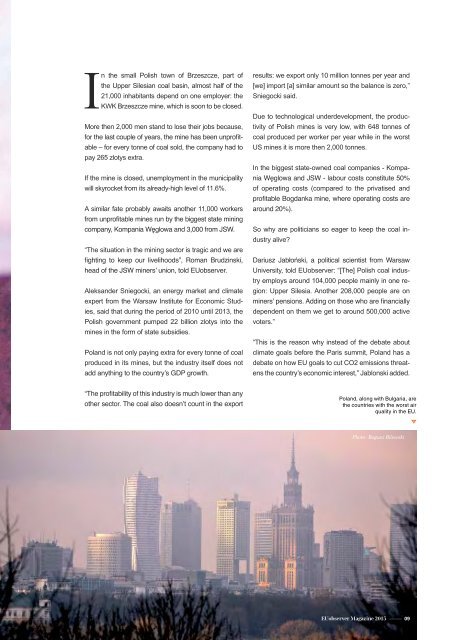Climate change: What are the regions doing?
The 2015 edition of EUobserver's Regions & Cities magazine focuses on climate change and what cities and regions are doing.
The 2015 edition of EUobserver's Regions & Cities magazine focuses on climate change and what cities and regions are doing.
Create successful ePaper yourself
Turn your PDF publications into a flip-book with our unique Google optimized e-Paper software.
In <strong>the</strong> small Polish town of Brzeszcze, part of<br />
<strong>the</strong> Upper Silesian coal basin, almost half of <strong>the</strong><br />
21,000 inhabitants depend on one employer: <strong>the</strong><br />
KWK Brzeszcze mine, which is soon to be closed.<br />
More <strong>the</strong>n 2,000 men stand to lose <strong>the</strong>ir jobs because,<br />
for <strong>the</strong> last couple of years, <strong>the</strong> mine has been unprofitable<br />
– for every tonne of coal sold, <strong>the</strong> company had to<br />
pay 265 zlotys extra.<br />
If <strong>the</strong> mine is closed, unemployment in <strong>the</strong> municipality<br />
will skyrocket from its already-high level of 11.6%.<br />
A similar fate probably awaits ano<strong>the</strong>r 11,000 workers<br />
from unprofitable mines run by <strong>the</strong> biggest state mining<br />
company, Kompania Węglowa and 3,000 from JSW.<br />
“The situation in <strong>the</strong> mining sector is tragic and we <strong>are</strong><br />
fighting to keep our livelihoods”, Roman Brudzinski,<br />
head of <strong>the</strong> JSW miners’ union, told EUobserver.<br />
Aleksander Sniegocki, an energy market and climate<br />
expert from <strong>the</strong> Warsaw Institute for Economic Studies,<br />
said that during <strong>the</strong> period of 2010 until 2013, <strong>the</strong><br />
Polish government pumped 22 billion zlotys into <strong>the</strong><br />
mines in <strong>the</strong> form of state subsidies.<br />
Poland is not only paying extra for every tonne of coal<br />
produced in its mines, but <strong>the</strong> industry itself does not<br />
add anything to <strong>the</strong> country’s GDP growth.<br />
results: we export only 10 million tonnes per year and<br />
[we] import [a] similar amount so <strong>the</strong> balance is zero,”<br />
Sniegocki said.<br />
Due to technological underdevelopment, <strong>the</strong> productivity<br />
of Polish mines is very low, with 648 tonnes of<br />
coal produced per worker per year while in <strong>the</strong> worst<br />
US mines it is more <strong>the</strong>n 2,000 tonnes.<br />
In <strong>the</strong> biggest state-owned coal companies - Kompania<br />
Węglowa and JSW - labour costs constitute 50%<br />
of operating costs (comp<strong>are</strong>d to <strong>the</strong> privatised and<br />
profitable Bogdanka mine, where operating costs <strong>are</strong><br />
around 20%).<br />
So why <strong>are</strong> politicians so eager to keep <strong>the</strong> coal industry<br />
alive?<br />
Dariusz Jabłoński, a political scientist from Warsaw<br />
University, told EUobserver: “[The] Polish coal industry<br />
employs around 104,000 people mainly in one region:<br />
Upper Silesia. Ano<strong>the</strong>r 208,000 people <strong>are</strong> on<br />
miners’ pensions. Adding on those who <strong>are</strong> financially<br />
dependent on <strong>the</strong>m we get to around 500,000 active<br />
voters.”<br />
“This is <strong>the</strong> reason why instead of <strong>the</strong> debate about<br />
climate goals before <strong>the</strong> Paris summit, Poland has a<br />
debate on how EU goals to cut CO2 emissions threatens<br />
<strong>the</strong> country’s economic interest,” Jablonski added.<br />
“The profitability of this industry is much lower than any<br />
o<strong>the</strong>r sector. The coal also doesn’t count in <strong>the</strong> export<br />
Poland, along with Bulgaria, <strong>are</strong><br />
<strong>the</strong> countries with <strong>the</strong> worst air<br />
quality in <strong>the</strong> EU.<br />
Photo: Boguez Bilewski<br />
EUobserver Magazine 2015 ––––– 09


















